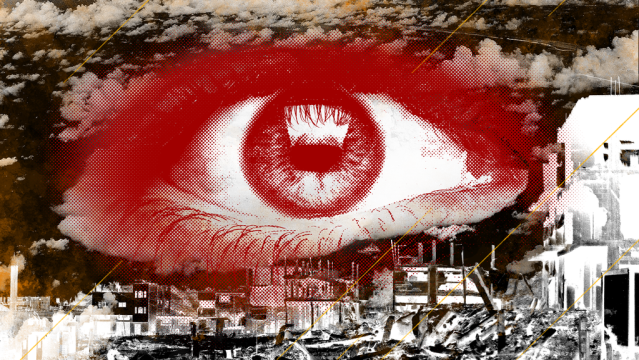“Hello? Is this the complaints department? I want to register a complaint about last year’s future; it’s completely broken!”
Art by Jim Cooke.
Quite a few of us have probably snarked like that about the anno horribilis 2016 (leaving politics aside entirely let me just say: David Bowie, Prince, Carrie Fisher*) but there’s a germ of truth in the assertion that global politics on 31 December 2016 was completely unpredictable from 1 January 2016. Just contemplate the US presidential election for a moment: While Hilary Clinton’s candidacy was almost locked in by January 1, the Republican candidate (and his electoral college majority) were not on even on the radar of his own party. Similarly, very few informed pundits anticipated that the usually-compliant voters of the UK would bite the patrician hand and by a narrow majority reject continuing membership of the European Union.
2016 was the year in which global politics went nonlinear. On which note, I’d like to stop talking politics and explain what this means for science fiction.
Over-generalising wildly, science fiction falls into two categories: Sci-fi with a far future setting, and Sci-fi about the present or the near future. Far future settings are fun to write, and they also insulate you from the slings and arrows of contemporary history in the making. If you’re playing in a Star Trek setting circa 2400, the events of 2016 are as remote as the events of 1916, or even 1816. And by “remote” I don’t mean that the denizens of 2400 might not have heard of Donald Trump; I mean they might not have heard of the United States of America — 2400 is as far away from us in time as 1632.
Near future settings, however, are another matter entirely.
I’m writing here because my publisher is keen to get the word out about my latest novel, Empire Games, which is set in the alternate-history version of 2020 that evolved from my earlier Merchant Princes books — a series that pulled a bait-and-switch by setting itself up to look like a portal fantasy, then took the premise seriously (and ended up in technothriller territory, with the President assassinated in 2003 by a stolen US backpack nuke, an India/Pakistan nuclear war and finally B-52s carpet-bombing the eastern seaboard of another time-line’s North America with H-bombs). I finished the last novel in the previous series in 2009, and began work on Empire Games in 2013, to a background of WikiLeaks, Edward Snowden’s veritable bombardment of leaks from the NSA and my editor telling me to downplay all the stuff about spies and Russia in my book because “spies are dusty and old-fashioned”.
So here’s the thing: By extrapolating from a minimally-divergent parallel universe that was almost indistinguishable from our own until 2003, I ended up writing my way into a bizarrely relevant sci-fi setting. Back in 2014, my main focus was on how an oppressive surveillance state might emerge in the United States in the era of smartphones, pervasive internet and a government waging endless war on the multiverse (in the name of hunting down extradimensional narcoterrorists). I was writing with Snowden’s leaks in mind, and using the dusty, old-fashioned relics of the Cold War that ended in 1991 for dry satirical effect (Rita, the main protagonist of Empire Games, has been raised by a feral ex-Stasi spy; she’s a natural for a secret US government agency).
Only then 2016 came along and sandbagged me. In the same month my book launches, the news cycle is dominated by headlines about warmed-over ex-Cold War Russian spooks compiling kompromat material and allegedly blackmailing the new President! Indeed, Vladimir Putin helpfully resurrected the old-time KGB — there’s nothing like a little of that good old name recognition! The Americans is snowballing on pay TV, sabres are being rattled over territorial claims in the South China Sea, everyone knows their email servers are tapped and (another plot strand in my book) unapologetic racists and homophobes are trying to drive the political agenda.
Some aspects of Empire Games remain unapologetic escapist science fiction. We don’t, as far as I am aware, live in a multiverse where the US government has access to technology that can send drones to map uninhabited parallel time lines for oil. The Department of Homeland Security has not been written a blank check to protect the homeland from all possible threats from parallel universes. We don’t even have a female Democrat President (although the one in Empire Games is not Hilary Clinton).
Near-future sci-fi is not a predictive medium: It doesn’t directly reflect reality so much as it presents us with a funhouse mirror view of the world around us. But in a post-truth world, it may be that only by contemplating deliberate un-truths can we retain our sense of what it is plausible to believe in the collage the media surround us with.
State surveillance with overt goals that differ from actual, unadmitted motivations? Check. Intelligence bureaucracies that have their own agendas, focused on institutional stability rather than carrying out their official mission? Check. Other groups infiltrating government agencies and using them for their own purposes, like parasitic wasps laying their eggs inside a paralysed caterpillar? Check. This is what near-future science fiction can do for us: It glues convenient handles — explanations we can grasp — on models of phenomena that mimic the patterns of the real world, and gives us the chance to infer the intentions of the hidden manipulators.
And that’s why near-future science fiction remains relevant — and dangerous — in the “post-truth” era.
*I’ll give 2016 a conditional pass for claiming Leonard Cohen; he was 82.
